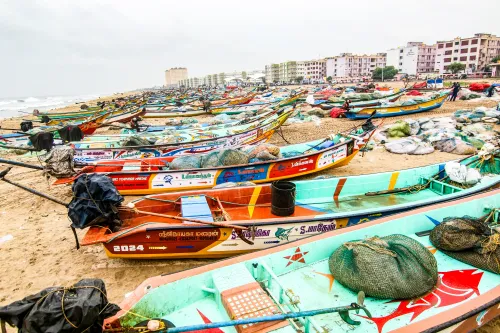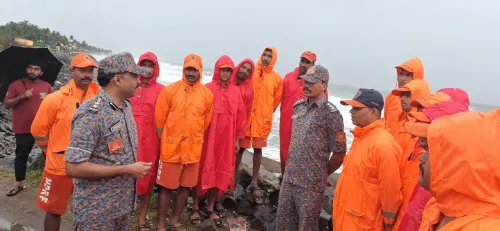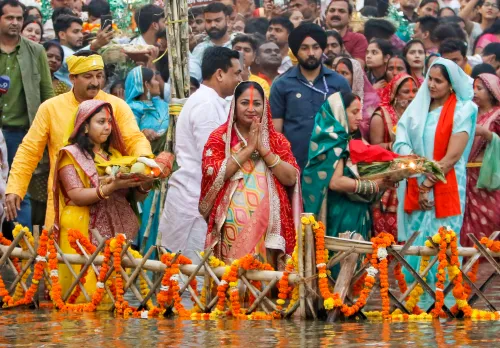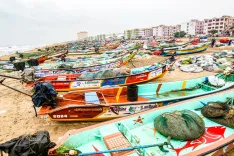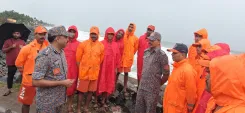RSS Aims to Initiate Regular Activities in Premier Institutes Nationwide
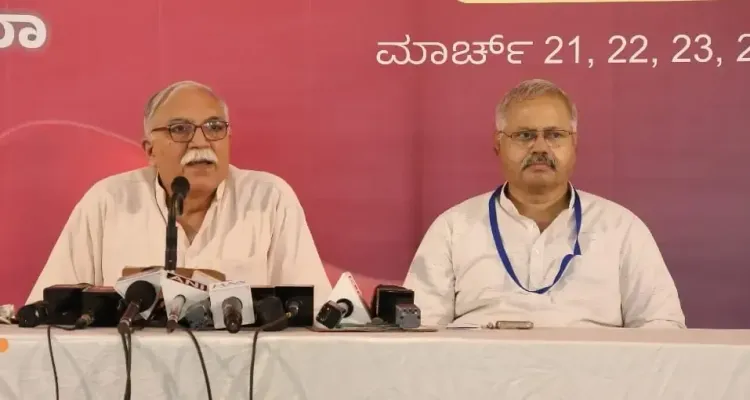
Synopsis
Key Takeaways
- RSS to launch activities in premier institutes.
- Regular work initiated in 134 institutes.
- Goal to reach all 2,009 premier institutes.
- Focus on inclusion and societal welfare.
- Women’s role emphasized in social development.
Bengaluru, March 23 (NationPress) The Rashtriya Swayamsevak Sangh (RSS) has announced its commitment to launching regular activities in premier academic institutions nationwide, having already commenced operations in over 100 institutes.
During a press conference at the Akhil Bharatiya Pratinidhi Sabha (ABPS) in Bengaluru on Saturday, RSS Joint General Secretary Arun Kumar highlighted the expansion of the Sangh’s initiatives, stating, “We recognized the void in premier institutions across the nation. Our focus shifted toward these centers, including the All India Institute of Medical Sciences (AIIMS), leading research institutions, and the Indian Institutes of Technology (IITs).
He further disclosed, “There are a total of 2,009 premier institutes in the country. We have begun our regular work in 134 of them, prioritizing our efforts. Moving forward, we aim to extend our reach to all 2,009 institutes, with the objective of establishing consistent activities. The process has already commenced.”
“Our ultimate goal is to evolve into a 100 percent movement. In this context, we refer to ‘Sarvasparshi’ (inclusion of all) and ‘Sarvavyapi’ (reaching everywhere),” he noted.
As the RSS approaches its centenary, Kumar stressed the importance of refining and accelerating its activities, with speed being a primary focus. “Six years ago, we set our targets. Annually, we assess our progress, and by Vijaya Dashami in October 2025, when we kick off our centenary celebrations, we intend to meet our objectives,” he announced.
“Our aim is to engage more individuals in daily contributions and ensure alignment among society’s leaders across economic, social, religious, educational, and intellectual domains. Since they share our concern for societal welfare, we plan to collaborate wherever feasible. Our initiatives have been designed with this vision,” Kumar explained.
He added, “On Sunday, we will unveil our vision for the Sangh's centenary to the media, alongside an analysis of the current scenario and our role within it.”
Discussing the expansion of the Sangh’s outreach over the years, Kumar remarked, “A review of our work reveals its distinctive nature. The RSS initiated its activities in 1925, and by 1940, we had reached every corner of the country. By 1972, we established our presence in every district. By 1996, we expanded to every block and city. Currently, we cover 85 to 90 percent of the nation, and we are quickly progressing towards complete coverage.”
He underscored the Sangh’s initiatives across different social strata, stating, “In Odisha’s Koraput division, primarily a tribal region, we are active in every mandal, with 1,031 shakhas (branches) operational, all staffed by locals. Similarly, the RSS commenced its work in Arunachal Pradesh in 1990, and today, our activities encompass every district of the state. While this may seem straightforward, reaching these remote areas presents significant challenges. Some locations require four to five days to access, and all our workers are volunteers—there are no paid staff,” Arun Kumar shared.
He further revealed, “In the past year alone, 200,000 workers have dedicated at least seven days each to furthering the Sangh’s mission. We also identified around 200,000 prominent individuals, including both men and women who are leaders in society and hold important positions at various levels. Our goal was to connect with them, and last year, we successfully reached out to approximately 150,000 of them.”
Highlighting the significance of women in society, Kumar stated, “Women should assume a larger role in social development. In line with this belief, we engaged with active women in society and organized leadership summits tailored for them. Last year, 472 such summits were conducted, inviting 575,000 socially active, intellectual women contributing to various fields.”
“When tackling social issues, the emphasis should be on finding solutions. Simply submitting requests and suggestions to the government does not align with the Sangh’s approach. Our methodology is unique. Societal issues should be addressed through the strength of the community itself,” he emphasized.
As an illustration, he stated, “In Madhya Pradesh’s Jhabua district, children are born with fused limbs, complicating their ability to lead normal lives. We convened doctors and organized discussions to resolve the issue. Over the past four years, 500 children have undergone corrective surgeries. This exemplifies our problem-solving approach,” he underscored.

